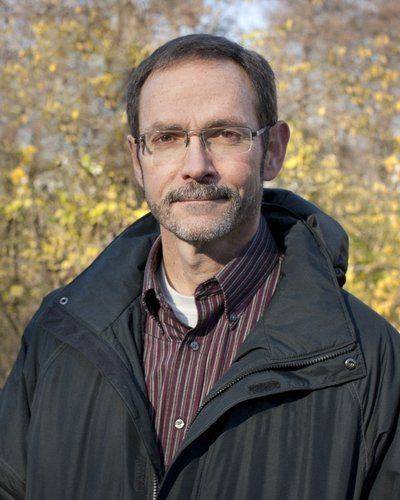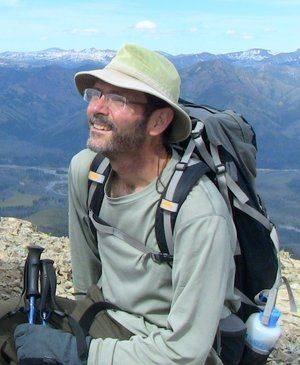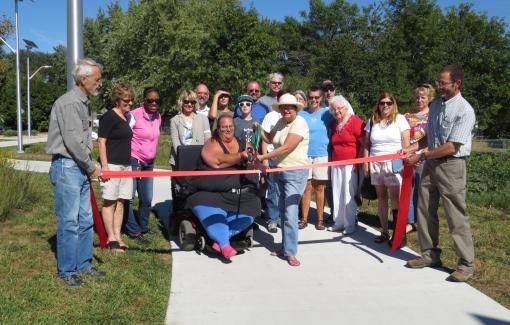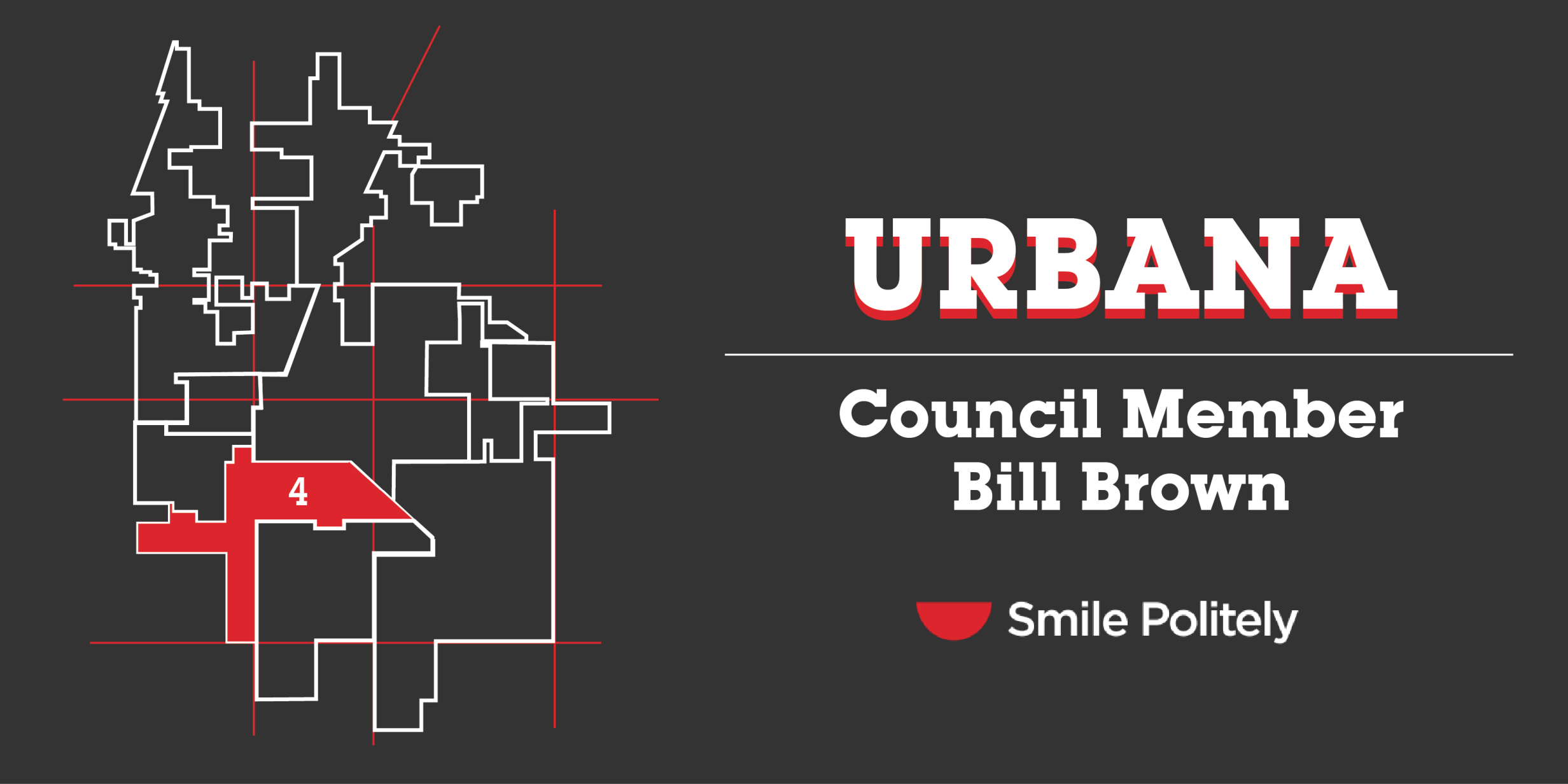 Bill Brown is one of Urbana’s newest council members; he’s been on council for less that a year. He agreed to talk with me as part of Smile Politely’s ongoing series on local public officials. We chatted at the Krannert Center for the Performing Arts, though Bill mentioned that if laptops didn’t have to be involved, he would have preferred to meet at Crystal Lake Park to take a walk in the snow.
Bill Brown is one of Urbana’s newest council members; he’s been on council for less that a year. He agreed to talk with me as part of Smile Politely’s ongoing series on local public officials. We chatted at the Krannert Center for the Performing Arts, though Bill mentioned that if laptops didn’t have to be involved, he would have preferred to meet at Crystal Lake Park to take a walk in the snow.
Question 1
Smile Politely: What are your connections to Urbana?
Bill Brown: I came to school here in the fall of 1976, and I stuck around ever since. But my family is from St. Joseph, and my mom’s family is from Urbana, so I have pretty deep roots here. My grandfather was actually park district superintendent for about 40 years in the early part of the 20th century. And my great uncle Bunny started Bunny’s Tavern in downtown Urbana, though probably about a dozen people could say that because his family was pretty big.
I lived in Champaign for the first 15 or so years that I lived here, but when I finally got around to buying a house I bought one in Urbana because I had some friends who lived in the area where I bought my house.
Question 2
SP: What differences do you see between living in Champaign and living in Urbana?
Brown: The main differences in terms of taxes are for the school and park districts. Urbana’s city levy is within pennies of Champaign’s. But Urbana has passed some park referendums to increase support for pools and things like that. Urbana’s school district is at a bit of a disadvantage on the basis of assessed valuation because a lot of our valuation is consumed by the university and hospitals other things that aren’t taxes, so the homeowner’s part is bigger. It does cost me about an extra $50-100 per month tax wise to live in Urbana, which I considered when I moved in. But there aren’t many areas where you can live so close to campus, and I like that
Question 3
SP: I’ve heard some people talk about cultural differences in terms of living in Champaign versus Urbana. Do you notice that?
Brown: I think the cultural differences are a bit overblown. I think I hear that more from people from Champaign than people from Urbana. When I first moved to Urbana, people called it Granolaville, and now people call it People’s Republic of Urbana, so there’s definitely a reputation, with the natural food stores and other kinds of businesses. But I don’t know how well deserved that distinction is
There have been big differences in terms of development patterns; for instance, when the railroad came to Champaign and when I-57 was built. The government structure is also different. In Champaign, the city manager structure makes the city work more like a business. In Urbana we have smaller wards, which only around 6,000 people on average. And the council sets the city’s agenda.
Question 4
SP: What is your background outside of the city council?
Brown: I work in the college of Veterinary Medicine at the University. I work with spatial epidemiologists using geographic information systems to track and model wildlife diseases. But as part of our lab—which is considered service lab, meaning that we do contracts for different groups on campus—I work with a public health group on a lot of demographics. I’ve looked at C-U pretty closely. As far as the workforce goes, we’re really pretty similar. About 13-14% of both cities work in health care. In education, it’s 27% for Urbana and 22% for Champaign. So the two cities are pretty similar.
There is a bit higher unemployment rate in Urbana, about 1 – 1.5% higher in recent years. That’s weird because we have about twice as many jobs in Urbana as employees due to the university and schools. But we draw employees from all over: a lot of people from Champaign and the county work in Urbana. So we probably need to work on some workforce development issues to make sure people in Urbana have the right skills for the jobs we have. We also need to work with the employers we have to make sure they give equal opportunity to people to get those jobs.

Question 5
SP: Why did you decide to get involved in public office?
Brown: I surprised myself I think. I’d been active in a neighborhood group in Champaign in the early 90s; I helped found a neighborhood association near downtown Champaign at that time. We accomplished a few things, like new sidewalks and things like that. It was enough to give me a boost and make me realize I could make a difference. It was interesting working with the mayor, Dan McCollum.
Also, working with the Lierman Neighborhood Association was one of the more instrumental reasons I decided to run. That Association was able to get the city to buy a vacant lot and use it for a community garden. We also got the city to develop a path that helped people reduce their walking time to a grocery store and really made a difference in people’s lives.
I’ve also been involved in volunteer groups, like the Greater Community AIDS Project. And also for the last 10 or so years I was involved in the Champaign County ACLU. I was president of that for a few years. I did some lobbying and interacted a lot with public officials.
Eventually, that combination came together. When I heard the previous ward wasn’t running, I decided to run.
Question 6
SP: Can you say more about what specifically you did in those volunteer organizations?
Brown: With GCAP, I was an officer for a few months. I also volunteered to fix up a house for people with AIDS on John Street, which still exists. It’s called Champaign House, and that’s where GCAP’s headquarters is.
In the ACLU, I got involved because I noticed there were some issues with people getting arrested on relatively minor chargers and pleading out without what I thought was adequate representation. So I went to the ACLU, and after a while I joined the steering committee. I was also involved in criminal justice issues, equal marriage issues, and free speech issues with the U of I.
For instance, in one case, the administration was trying to get professors to not wear campaign buttons or even have campaign bumper stickers on their cars. So we spoke up and got our state office to write a letter that was influential in having the university rescind part of that rule.
In another case, the University was trying to prevent professors from contacting potential sports recruits about what they felt was the racial implications of the Chief Illiniwek symbol. We never took a stand on Chief Illiniwek, but we felt that professors should not be prevented from contacting potential recruits.
Question 7
SP: How would you characterize yourself in terms of your political philosophy?
Brown: I’m definitely for economic justice and racial justice. But beyond that, my interest in municipal government isn’t really political. It’s about quality of life issues, especially creating a better place for people to work and live. My geographic information system background, especially working with urban planners, has sparked my interest in development issues. That makes me believe in investing in infrastructure.
 Question 8
Question 8
SP: Who are your political heroes?
Brown: I’m old enough to remember Bobby Kennedy and Martin Luther King Jr. More recently, I admire Barak Obama and Bill Clinton. And Dan McCollum from Champaign. Those people have all been influential for me.
SP: What binds that group of names together in terms of a driving philosophy or style of leadership for you?
Brown: I guess they’re all a little idealistic. And focused on issues that affect people in a really personal way.
Question 9
SP: What issues have most captivated your attention during your time on council?
Brown: The Urbana Free Library has been an important issue for me. We’re almost done with the interview process for a new director, and I’ve been involved in that. It’s great that we have such great community support for our library.
Personnel issues at the city have been a bit distracting because we’ve had a lot of turnover and we’ve had trouble filling jobs quickly, which I guess is nothing new, but something we have to deal with.
The taxation issue due to the loss of revenue from the hospitals is something that’s been on my mind. This issue came about from a law passed in 2012 that redefined what constituted charity care by hospitals. It was part of a massive revenue bill, the final goal of which was to obtain matching federal funds for the expansion of Medicaid. There was a weird amalgamation of issues in one bill, and part of it was a more liberal definition of charity care.
The interesting thing for me is that for profit-making, owner-invested hospitals, the credit goes against state income tax and is therefore shared by everyone in the state, which makes sense because the state benefits from the expansion of Medicaid. But in the case of nonprofit hospitals, the credit goes against property tax and the local community has to deal with the loss of tax revenue. I think it was an odd legislative initiative. Carle’s been a good partner with Urbana, so we need to find a way to move forward.
Other than that, improving downtown has been at the forefront of my mind. One thing Urbana has going for it is the location of the downtown and the support the Urbana residents give, especially through the market downtown in the summertime. There’s a lot of affection for downtown. What we really need is more development.
When I lived near downtown Champaign in the early 90s, it really hadn’t started picking up. Maybe Urbana is starting to approach that point now. There are a lot of popular businesses here now: Black Dog, Courier Café, the shoe stores. We’re starting to pick up.

Question 10
SP: What issues do you think are most important to your ward right now?
Brown: My ward is pretty diverse. Most Urbana wards are, but mine in particular. It starts near campus and includes student housing like Orchard Downs, but then it also includes the high school, the middle school, east Urbana and the Am Vets neighborhood. So you have a university professor community, a lot of students, especially international students and married students, and then a lot of first-time homebuyers and longtime residents as you go east.
When I campaigned, I had an excuse to knock on a couple hundred doors and meet a lot of people. I think historic preservation and neighborhood preservation is the main issue on the west side. And the next main concern, on the east side, has to do with some crime problems. It’s mostly petty crime, like opening car doors and taking change out. But there have been some more serious crimes, like burglaries. That area is interested in lighting and sidewalks.
Question 11
SP: What kinds of businesses or public spaces do you really enjoy in Urbana?
Brown: Crane Alley, Pizza M, Crystal Lake Park. I also really like just walking through the mall on a Saturday afternoon in the winter. And the Market.
Question 12
SP: What are your thoughts on concealed carry?
Brown: I don’t have strong feelings about it. I think people should have the right to have guns. But I don’t feel very comfortable about people having guns around me in public spaces. But one good thing about the law is it requires people to have a lot of training. I’m hopeful that people will take the training and then realize that in most cases they don’t really need to carry their guns.
I do feel a little weird having all the signs against carrying guns around campus, which are new as of January 1st. Maybe after a while we’ll get used to them, but for now I think those signs are having a negative psychological effect on some people.
Question 13
SP: Same-sex marriage?
Brown: Definitely in favor. I’ve been in a committed relationship with my partner for around 17 years. We’re not married, but I think for younger people it really opens up a whole new world.
Question 14
SP: Could you comment a bit on your views on the Affordable Care Act?
Brown: A few years ago I had a friend who died from a minor illness, a stomach ulcer, which no one should die from. He had medical debt, so he didn’t want to go to the hospital. It was horrific, and that confirmed my belief that affordable health care has to be available for everyone. I’m not sure how the law will work economically, but it’s a good start.
Question 15
SP: Would you change anything about how the Urbana City Council operates?
Brown: There’s one specific thing, which is that when we make changes to something before we pass it, those changes should be available to the public so they can see the final version online. No one was opposed to that idea; it just hadn’t received a lot of attention before.
We do tend to nitpick a lot at language during council meetings. I hope we can work more on our language in the early stages of developing legislation so we can use our time more effectively during meetings.








